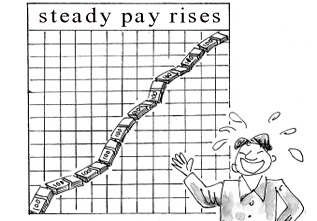| Home / Government / Focus News | Tools: Save | Print | E-mail | Most Read |
| Steady Pay Rises Good for Growth |
| Adjust font size: |
Giving workers regular and steady pay rises will sharpen companies' competitiveness and quicken economic growth, a senior official said yesterday.
"Cheap labor has long been an economic advantage for our country," Qiu Xiaoping, from the Ministry of Labor and Social Security said in a Web-cast on the government's website (www.gov.cn). "However, if average pay levels remain low or increase only slowly over a long period, the economy will be damaged by the widening income gap, which will stifle consumption and lead to a high trade surplus," he said. Qiu said that in the long run, by paying staff decent wages, companies will benefit from both technological advancements and by being more competitive. Qiu expressed concern that the wage gap across different parts of the country and within different industries was widening, despite recent figures suggesting average annual salaries had risen. He said statistics that pointed to rapid pay growth were misleading as they hid the fact that some low-income groups had received no such increments, and in some cases had actually seen their wages slide. According to the Beijing bureau of statistics, in 2006, the average annual pay (before tax) of a Beijing worker was 36,097 yuan (about US$4,770). However, almost 61 percent of workers earned less than that. The figures also showed that workers in the security, banking, legal services, shipping, civil aviation, oil and natural gas industries had the highest average annual salaries (100,000 yuan and above), while those in the garment and textile industries received an average of just 16,000 yuan. Qiu said last year, local governments across the country introduced new regulations on minimum wage rates in a bid to boost the salaries of the nation's lowest paid workers. Twenty-nine of the 31 provinces, municipalities and autonomous regions on the mainland upped their minimum wage rates by an average of 30 percent. In Shenzhen, south China's Guangdong Province, the minimum monthly wage was increased to 810 yuan, the highest in the country. Qiu said that as long as the terms of the minimum wage regulations were met, as in any market economy, companies were then free to set their own pay scales. However, the newly passed Labor Contract Law stipulates that all issues concerning workers' direct benefits, including pay and work quotas, should be agreed on through consultation between workers and management. Qiu acknowledged that increases in the price of housing, medical services and education over recent years had put extra pressure on families' finances and negated pay rises to some extent. According to the National Bureau of Statistics, the national average pay has achieved annual double-digit growth over the past four years, faster than GDP growth over the same period. Xia Yeliang, a professor of economics at Peking University, said pay increases stimulate consumption among low-income groups much more than among high-income earners, who effectively energizes the market and promotes economic growth. Liu Bingquan, a researcher with the Institute of Labor Studies in Beijing, said maintaining steady pay growth should be a basic policy during the current period of economic transformation. (China Daily July 18, 2007) |
| Tools: Save | Print | E-mail | Most Read |
| Related Stories |
|
||||
|
|
||||||||||||
|
| Links | |||||||||||
|
